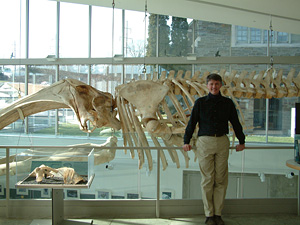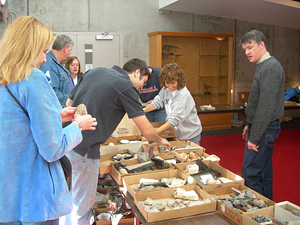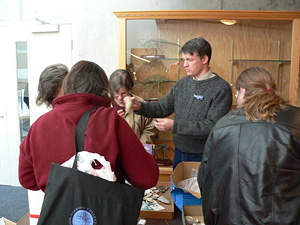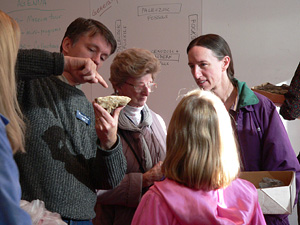 PaleoPeople
PaleoPeople
Warren Allmon
Paleontological Research Institution (PRI) and the Museum of the Earth (MotE), Ithaca, NY, USA
— Interview conducted September, 2009
Dr. Warren Allmon is Director of the Paleontological Research Institution (PRI) and its Museum of the Earth (MotE). His major research interest is the ecology of the origin and maintenance of biological diversity and the application of the geological record to the study of these problems, especially in one family of marine gastropods (snails), the Turritellidae. Most recently, Dr. Allmon has been working on the evolution of gastropods across the global warming event at the boundary between the Paleocene and Eocene epochs (ca. 55 milion years ago). Dr. Allmon is the author of numerous technical and popular publications; his most recent book is Stephen Jay Gould: Reflections on His View of Life (Oxford University Press, 2009) which he edited with Dr. Robert Ross (also at PRI) and Dr. Patricia Kelley (University of North Carolina Wilmington). He is a Fellow of the Geological Society of America. |
 Warren with the modern whale skeleton hanging near the entrance to the Museum of the Earth. Photo courtesy of PRI. |
A: I was born in New York City and I remember first going to the American Museum of Natural History when I was three years old. The love of paleontology just stuck with me. I collected my first fossil at age 12. I was so into dinosaurs in elementary school that it became a standard joke in art classes that, no matter the medium du jour, "Warren is going to make a dinosaur!"
I have to be in a museum. I knew that if I didn't end up in one, I would have to build one! One reason is that I never met a fossil I didn't want [laughing]. The notion of not having a fossil collection is awful. I pick up fossils all the time. After the North American Paleontological Convention last summer, I stopped at a roadcut on the way to the airport and collected 100 pounds of fossils. Those slabs are now in the Museum of the Earth.
Q: What is your particular area of expertise within paleontology?
A: On the theoretical side, I am interested in macroevolution and the ecological context for speciation. With respect to more empirical work, I am particularly interested in Cenozoic mollusks, especially the marine snail family Turritellidae. I have an ongoing project studying turritellid-dominated assemblages, and much of my research has to do with questions of macroevolution and diversity within this group. I am also working on several taxonomic projects on various fossil and living species in this group. I am often able to get students involved in my research projects.
Q: Would you describe for us a "typical" day for you at PRI?
A: I am officially a half-time professor at Cornell and a half-time Director of PRI, but in practice these are both closer to full-time responsibilities. In my professor role, I teach undergraduates and supervise graduate research every week. At PRI, I spend a lot of time on administrative duties. I review exhibit proposals, meet with the staff of each group within the Institution — for example, Education or Publications — and solicit new members for our Board of Trustees. I do strategic planning and fund-raising … this means I do lots of lunches [laughing]! Publicity and marketing are important. I talk to the media and make sure we are presenting the right message on our website. I am the one responsible for maintaining our good relationship with Cornell, which involves a lot of face time on campus.
I also interact with visiting scientists and work on collections policies. The other day Whitey Hagadorn [Dr. James W. Hagadorn, now of the Denver Museum of Nature and Science] walked in and we spent time talking about an interesting specimen.
Through all of this, I have learned not to let little crises get to me. Big crises do still get to me.
 Watching as Ithaca area teachers choose samples for their classes on Teacher Resource Day at the Museum of the Earth. Photo courtesy of PRI. |
A: I do work at least 60 hours every week, which isn't enough, but now that I am a father, my priorities have changed a bit.
Q: Do you get to do fieldwork anymore?
A: Not as much as I would like. I was part of a group from the University of Florida that went to northern Chile in 1999. This NSF-funded project resulted in collections that one of my Ph.D. students studied as part of her dissertation, and ultimately in a couple of papers. The last time I was in the field was spring of 2007, also funded by NSF, when another Ph.D. student and I went to New Zealand to start her dissertation research on fossil turritellids there.
Of course, I really wouldn't have to go into the field at all to do research. I have our whole fossil collection downstairs to keep me busy.
Q: Would you tell us about the most exciting thing that has happened to you during your career to date?
A: That might have to be finding the Hyde Park Mastodon in 2000 … that was cool! I know that has nothing to do with speciation or marine snails, but it was very exciting, particularly when it became clear that this was a virtually complete specimen. The New York Times and other media got involved; the Discovery Channel made a film of the project — also cool — and it also generated a lot of research by others (which I edited into a substantial volume of one of PRI's journals) and the publicity helped the Museum a lot.
The other exciting — perhaps I should say overwhelming — project was designing and opening the Museum of the Earth here at PRI. We started planning for it in 1994, and the Museum opened in 2003. It was a huge undertaking for such a small organization. But the hardest, most expensive part of the whole thing was actually done before I was born, with the assembly of the large Cornell and PRI collections — PRI houses all of Cornell's non-botanical fossils. So we had the specimens, a world-class collection of them, without which there could be no museum. Furthermore, there was no natural history museum between New York City and Buffalo, so there was a "market" for one, and with its spectacular geology and abundant fossils, Ithaca was a perfect site. A big part of our motivation was that we sincerely believed that it was important to have this kind of museum here, as a resource for Cornell and all of upstate New York, particularly in this time of global change and public ignorance of science. While the exhibits in the MotE certainly reflect Rob Ross' [Associate Director for Outreach] and my view of how you study evolution, the exhibits — and the museum — would not exist if it weren't for the dedication, hard work, and support of many other people! We're very pleased with the results.
Q: What advice would you give someone interested in becoming a paleontologist?
A: I found a letter written to my mother by people at the American Museum of Natural History in New York City, responding I guess to a letter she had written them when I was a kid basically asking the same question. When I arrived at PRI seventeen years ago, this was also the most frequently asked question in the letters we received. I wrote the "So you want to be a paleontologist" portion of our website in answer to these requests for information on paleontology as a career — I included some of what the AMNH sent my Mom! This has become our most often-hit page.
I tell students that paleontology integrates biology and geology, so you need a really strong grounding in both disciplines or you won't be a good paleontologist. Double major, if possible. And an important pat of this is that some subjects that might not seem necessary for paleontology — like physics and math and languages, and even history — is still stuff you need to know.
 Discussing fossil horn coral with teachers on Teacher Resource Day. Photo courtesy of PRI. |
As to where to go to grad school, I give undergraduates interested in grad school a speech about "it's not a fair world." In a fair world, grad schools would be judged only by the quality of their program, but in truth they're judged first by their overall reputation, so you need to go to the graduate school with the biggest name you can get into. This discriminates against smaller or lesser-known programs, but there's no way around it. The thing is that you're actually probably going to be hired by a geophysicist or hydrogeologist, not another paleontologist, and he or she won't be looking at your paleontology courses or even know much about paleo at your Ph.D. institution; they're going to be looking at your institution. Also, pick a research project that you are truly passionate about; you'll hate it in the end, and passion will be the thing that carries you through! Choose a specimen-based project, not a taxon-counting, literature-based one. That can come later.
This sounds syrupy to say, but I had wonderful, supportive parents. They indulged my interest to an incredible degree. I could have done anything in life. But, I can't think of anything more important I could do with my skills than using fossils to understand the history of life and evolution … and telling people about these.
Rob [Ross] and I think of paleontology as an umbrella science, because we were trained in graduate school together to think of paleontology not as a narrow specialty, but as a broad concept encompassing all of biology and geology. To study paleontology is to be a naturalist. Who is better equipped to deal with important problems arising in areas such as conservation and climate change than paleontologists? It is patently obvious that the rest of the world doesn't see this. Everybody is interested in the environment and global change, but they don't understand why paleontology is useful in dealing with them. If everyone did understand paleontology, a lot about how and what we do with respect to these problems would change.
 Pointing out details of a fossil to teachers. Photo courtesy of PRI. |
A: There's a New Yorker cartoon that I keep posted near my computer in my office, and I show it frequently in lectures. It shows a crowded living room with members of an extended family of all ages doing all kinds of things. In the back corner, clearly marginal to the activity, is a very aged "Grandpa," looking at fossils with a magnifying glass. What I love about this cartoon is that it shows what most people think about paleontology — that it's an arcane, slightly daffy, and certainly peripheral pursuit. And yet in reality it's the exact opposite. To be a paleontologist is to fathom the connections between life and the Earth — one of the biggest of all possible scientific topics. And it's a topic that has never been more important. Think about the most important problems facing humanity today — those that will ultimately decide how our children's children live: global climate change, energy, water, food, environmental degradation. And look at the declining levels of scientific literacy with which people are trying to solve — or even recognize — these problems. Paleontology is the perfect field to address these — and to equip others to address them. I really believe this. With all the enormous problems in the world today, I think that improving people's understanding of the Earth and its life — and how science gains this understanding — is one of the most important things one could be doing with one's career.